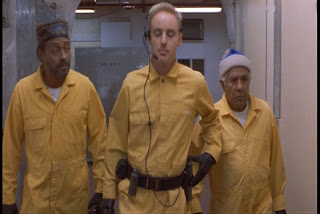Mr. Fox (George Clooney) used to steal birds but has reformed his ways and is now a newspaper man. He is getting old and tired of living in a foxhole. So, he consults with his real estate agent Stan Weasel (Wes Anderson). Before he takes the plunge, Mr. Fox talks with his lawyer Clive Badger, Esq. (Bill Murray) and ends up buying a treehouse so that he and his family can live in comfort. However, cousin Kristofferson (Eric Anderson) comes to visit and makes Ash (Jason Schwartzman), Mr. Fox’s son, jealous with his athletic prowess. Meanwhile, in her spare time, Mrs. Fox (Meryl Streep) paints portraits of thunderstorms.
Mr. Fox decides to pull one more job stealing birds to eat but this one is his most ambitious gig to date. With the help of his landlord Kylie (Wally Wolodarsky), he plans to steal chickens from farmer Boggis, then the next night geese from farmer Bunce, and finally the following night he steals some of farmer Bean’s cider from his secret cellar. Understandably upset, the three farmers get together and plan to kill Mr. Fox. As a result, he and his family are on the run and hunted. They have to call in the favors of all their friends if they hope to evade the farmers’ wrath.
Anderson still has an uncanny knack for picking just the right song for a given scene. Early on, Mr. and Mrs. Fox playfully yet stealthily circumvent a farmer to steal one his birds all scored to the melodical strains of “Heroes and Villains” by the Beach Boys. Later on, Anderson pulls out the obligatory Rolling Stones cue and scores a sequence to “Street Fighting Man.” There is something thrilling about seeing these vintage tracks pop up in an animated film – a genre that tends to rely on mainly orchestral music or more contemporary songs.
The stop-motion animation actually gives the film a personal, handcrafted feel that has been absent from Anderson’s recent work and harkens back to his first couple of efforts, which are the ones where most people first noticed and fell in love with his films. The animation is incredibly rendered and executed, reminiscent of the vintage Rankin and Bass cartoons that kids of Anderson’s generation (and beyond) grew up on. There is a tangible quality to the characters and their environment that is still missing from most computer animation.
As the Fantastic Mr. Fox (2009) progresses, it becomes apparent what drew Anderson to this project. Thematically, it fits right in with his other films. Mr. Fox is a charismatic yet rebellious patriarch, much like Royal in The Royal Tenenbaums and Steve Zissou in The Life Aquatic with Steve Zissou (2004). Furthermore, the Fox family is a highly intelligent dysfunctional one much like the family in Tenenbaums. The casting is spot on with George Clooney and Meryl Streep playing Mr. and Mrs. Fox. They banter back and forth like a couple from an old screwball comedy. Anderson has not forgotten what the majority of animated films not made by Pixar seem to have – that the best of the genre appeal to both kids and adults. Fantastic Mr. Fox does not talk down to kids and also still manages to appeal to the Anderson faithful. This film is a delightful, entertaining adventure well worth experiencing.
Special Features:
“From to Script to Screen” briefly explores how Anderson and his co-screenwriter Noah Baumbach took Dahl’s short story and expanded on it, even creating characters but all done in the spirit of the source material. Anderson says that he approached the animated film as if it was a live-action one with collaborators commenting on how the director managed to infuse it with his distinctive style. To this end, he storyboarded the entire film and shot video of himself acting out the story so that the animators knew what he wanted.
“Still Life (Puppet Animation)” takes a look at the stop-motion animation process. It is very meticulous and time consuming but if done well, looks great. It’s amazing how the animators can get expressions and emotions out of these puppets.
“A Beginner’s Guide to Whack-Bat” is a humourous mock-featurette on how to play this bizarre sport within the film.
Finally, there is a theatrical trailer.





